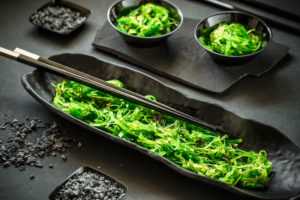Potential cancer fighting properties in seaweed
Seaweed has been known for millennia to have anti-cancer properties. The Egyptians used seaweed to treat breast cancer as early as 2640 BC, while both Traditional Chinese Medicine and Japanese Folk medicine use seaweed to treat tumors. Modern science is now recognizing how important seaweed can be for cancer prevention, with studies showing that a diet rich in seaweed can dramatically reduce blood markers linked to breast cancer.
The growth of abnormal cells characterizes cancer, and there are more than 100 cancerous diseases with an enormous health burden worldwide. Carotenoids are a class of biological pigment which are known to have beneficial effects for cancer prevention. Carotenoids, including fucoxanthin, are in many seaweed species and considered by researchers to have incredible potential cancer-fighting properties with promising applications in other areas of human health. Fucoxanthin is one of the most readily available carotenoids that is the subject of research. It is known to stop the growth cycle of cancer cells leading to programmed cell death dramatically slowing cancer growth. Currently, most of the research studies on the anti-cancer effects of Fucoxanthin are focused on animal subjects. Scientists are excited by the prospect of developing cancer-fighting medications from seaweeds for humans.
 Much of this work is with brown seaweeds that have high levels of fucoxanthin. There is accumulating evidence that shows fucoxanthin may have reduction anti-cancer effects on several cancer cells such as lung, breast, colon, prostate, and bladder cancer.
Much of this work is with brown seaweeds that have high levels of fucoxanthin. There is accumulating evidence that shows fucoxanthin may have reduction anti-cancer effects on several cancer cells such as lung, breast, colon, prostate, and bladder cancer.
Fucoxanthin has significantly inhibited the growth of prostate cancer by destroying prostate cancer cells. Fucoxanthin has also been identified to substantially reduce the growth of urinary bladder cancer cells by acting as a cancer-inhibiting agent. In a study on mice with skin tumors, the mice were fed fucoxanthin, which led to the suppression of skin tumors resulting in a reduced number of tumors. Studies on human lung cancer cells treated with fucoxanthin also showed a decrease in the number of human lung cancer cells.
The effect of fucoxanthin does not stop at cancer cell reduction. There have been many reports indicating fucoxanthin has a protective effect against the dangerous side effects of drugs. Because fucoxanthin is a natural compound, it is effective without being toxic to the body. It reduces cancer cells plus decreases side effects of conventional cancer treatments leading to improved quality of life cancer patients.
It is not just brown seaweed with anti-cancer activity. Other seaweeds also have anti-cancer activity, but the mode of action is less well understood.
Cancer Research on Pacific Seamoss
One particular seaweed, Pacific Sea Moss©, a red seaweed, containing fucoxanthin in smaller amounts, has been researched on its anti-carcinogenic effects. In Asian cultures such as Korea, Japan, and parts of China, the red seaweed found in Pacific Sea Moss© has long been part of the diets where its consumption is associated with reduced prevalence of breast cancer. Seaweed is also used to treat tumors in traditional Chinese medicine.
Scientists have undertaken several tests on rats induced with a human breast tumor. Once the rats started eating the red seaweed found in Pacific Sea Moss© (Euchemia denticularum “spinosum”), the breast tumors began to decrease in size and number. The mechanism is complicated, but it seems that the seaweed changes the gut microbiome, which reduces the levels of estrogen, which decreases cancer prevalence. The results highlight the importance of marine dietary fiber as a food supplement.
Tests undertaken on human colon cancer cells have showcased the anti-carcinogenic effects of Euchemia spinosum, whereby the human colon cells have died after being administered with the red seaweed found in Pacific Sea Moss©.
Verifiable evidence shows that adding seaweed in our diet may increase the capacity of our bodies to fight against different forms of cancer such as liver, bladder, breast, colon, and prostate cancer. Therefore, these results suggest that the intake of Pacific Sea Moss© has the potential of reducing the risk of several types of cancer.
We make no medical claims. But we all understand seaweed is healthy. Biosea Health provides seaweed in an easy to consume way with Pacific Sea Moss© Simply good healthy food.

